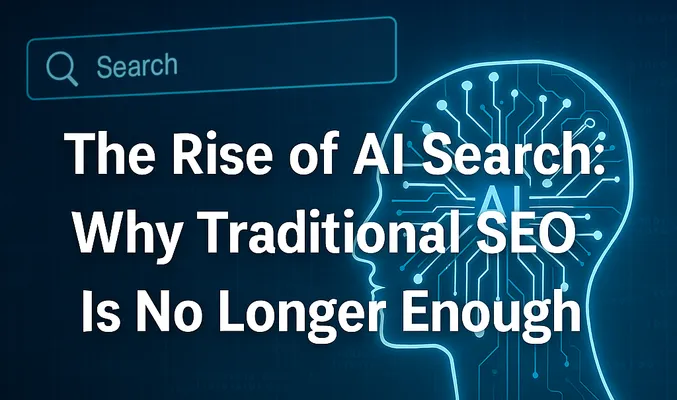AI Search: Why SEO Is No Longer Enough

Search is evolving - fast. What used to be a list of blue links is now a direct conversation with an AI. Tools like ChatGPT, Bing Chat, and Google’s AI Overviews are redefining how users find and consume information. Instead of clicking through multiple pages, users get synthesized, conversational answers in real time. For businesses, this means that showing up in the top 10 search results is no longer the end goal — because those results might never be seen.
Welcome to the age of AI search, where traditional SEO is just the beginning.
From Rankings to Relevance
Classic SEO has always been about optimizing for algorithms: keyword targeting, backlink building, technical tweaks. But AI-powered tools don’t just crawl and rank - they read, understand, and summarize. The content they serve up is not a link to your page, but a paraphrased version of your content, often without attribution.
To stay relevant, brands now need to think less about page rankings and more about how information is consumed inside AI systems. It’s not enough to appear on the first page of Google - your content has to become part of the AI’s answer itself.
AI Doesn’t Just Index - It Synthesizes
Large Language Models (LLMs) like GPT-4 don’t index websites the way search engines do. Instead, they train on massive datasets, absorbing patterns, facts, and language usage. When someone asks a question, the AI pulls from this vast memory and crafts a custom response.
This means that if your brand, product, or insight wasn’t part of that training data - or isn’t included in the trusted real-time sources AI refers to - you won’t be featured at all. Traditional SEO techniques like meta tags or structured snippets won’t help much unless your content is actually being read and understood by these models.
The New Pillars of Visibility
To compete in the world of AI-driven search, businesses need to expand their optimization toolkit. That means focusing on areas that increase your brand’s footprint across both training and retrieval sources:
- Expert-level content: Go deeper than keywords. Publish detailed, original content that’s likely to be referenced by journalists, researchers, and thought leaders - all of whom influence training data.
- Semantic clarity: Structure your writing in ways AI can easily interpret. Clear headings, well-defined questions and answers, and consistent terminology improve how models process your content.
- Authoritativeness: The more your content is cited by trusted publications, the more likely AI is to treat it as reliable.
- Multi-format presence: Blogs are just one piece. Also contribute to forums, podcasts, data repositories, and public knowledge platforms like Wikipedia.
In short, you’re not just optimizing for Google anymore - you’re optimizing for how machines learn and reason.
Real-Time AI Search Still Needs SEO — But Smarter
Some AI tools like Bing Chat and ChatGPT with browsing still use real-time web search. In those cases, the fundamentals of SEO still apply. But now, it’s less about outranking competitors for clicks and more about being the source AI chooses to cite.
To increase the chances of being cited:
- Use schema markup to highlight authoritative answers.
- Publish frequently updated, original content that answers specific queries.
- Prioritize Bing optimization, as Microsoft’s tools power many AI features.
These efforts help ensure your content is fetched and included in the response — not just displayed as an optional link.
There Are No Ads in AI Search
One of the biggest shifts? You can’t pay your way into an AI-generated answer. ChatGPT doesn’t offer sponsored results. Google’s AI Overviews don’t (yet) feature ads. In this new landscape, you win on merit, not marketing budget.
That makes earned authority - through relevance, trust, and visibility - more important than ever.
Preparing for the Next Era of Discovery
We’re entering a time when a growing number of users may never visit your site — but they’ll still interact with your content. Whether it’s through a snippet in ChatGPT, a quoted phrase in Bard, or a cited link in Bing Chat, your brand must be discoverable through the lens of AI.
Traditional SEO still matters, but it’s no longer enough on its own. The future of visibility belongs to those who optimize not just for search engines, but for the machines that now speak on our behalf.
If you’re not thinking about how AI sees your brand, you’re already behind.